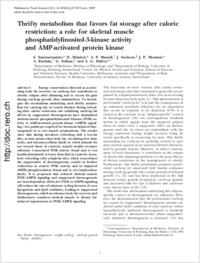Thrifty metabolism that favors fat storage after caloric restriction: a role for skeletal muscle phosphatidylinositol-3-kinase activity and AMP-activated protein kinase
- Summermatter, Serge Department of Medicine, Division of Physiology, University of Fribourg, Switzerland
- Mainieri, Davide Department of Medicine, Division of Physiology, University of Fribourg, Switzerland
- Russell, Aaron P. Centre for Physical Activity and Nutrition, School of Exercise and Nutrition Sciences, Deakin University, Melbourne, Australia
- Seydoux, Josiane Department of Basic Neurosciences, Faculty of Medicine, University of Geneva, Switzerland
- Montani, Jean-Pierre Department of Medicine, Division of Physiology, University of Fribourg, Switzerland
- Buchala, Antony J. Department of Biology, University of Fribourg, Switzerland
- Solinas, Giovanni Department of Medicine, Division of Physiology, University of Fribourg, Switzerland
- Dulloo, Abdul G. Department of Medicine, Division of Physiology, University of Fribourg, Switzerland
-
10.10.2007
Published in:
- Faseb Journal. - 2008, vol. 22, p. 774-785
English
Energy conservation directed at accelerating body fat recovery (or catch-up fat) contributes to obesity relapse after slimming and to excess fat gain during catch-up growth after malnutrition. To investigate the mechanisms underlying such thrifty metabolism for catch-up fat, we tested whether during refeeding after caloric restriction rats exhibiting catch-up fat driven by suppressed thermogenesis have diminished skeletal muscle phosphatidylinositol-3-kinase (PI3K) activity or AMP-activated protein kinase (AMPK) signaling—two pathways required for hormone-induced thermogenesis in ex vivo muscle preparations. The results show that during isocaloric refeeding with a low-fat diet, at time points when body fat, circulating free fatty acids, and intramyocellular lipids in refed animals do not exceed those of controls, muscle insulin receptor substrate 1-associated PI3K activity (basal and in vivo insulin-stimulated) is lower than that in controls. Isocaloric refeeding with a high-fat diet, which exacerbates the suppression of thermogenesis, results in further reductions in muscle PI3K activity and in impaired AMPK phosphorylation (basal and in vivo leptin-stimulated). It is proposed that reduced skeletal muscle PI3K/AMPK signaling and suppressed thermogenesis are interdependent. Defective PI3K or AMPK signaling will reduce the rate of substrate cycling between de novo lipogenesis and lipid oxidation, leading to suppressed thermogenesis, which accelerates body fat recovery and furthermore sensitizes skeletal muscle to dietary fat-induced impairments in PI3K/AMPK signaling.
- Faculty
- Faculté des sciences et de médecine
- Department
- Département de Médecine, Département de Biologie
- Language
-
- English
- Classification
- Biological sciences
- License
-
License undefined
- Identifiers
-
- RERO DOC 8675
- DOI 10.1096/fj.07-8972com
- Persistent URL
- https://folia.unifr.ch/unifr/documents/300591
Statistics
Document views: 233
File downloads:
- pdf: 238
